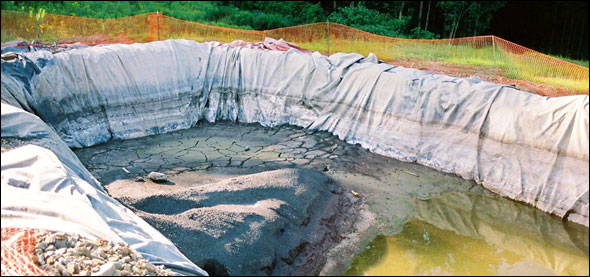**UPDATE: The Cornell paper is now available in final, published format here: “Methane and the greenhouse-gas emissions footprint of natural gas from shale formations.”[PDF]
The Hill reported this morning on a groundbreaking report from Cornell University researchers confirming that shale gas recovered through high volume hydraulic fracturing, or “fracking,” will produce even more greenhouse gases than the burning of coal in the next two decades – a critical window in which society must reduce emissions to combat climate change. While natural gas is often viewed as a “cleaner alternative” to conventional fossil fuels – and is often promoted as a “bridge fuel” by environmentalists and politicians alike – the new Cornell report explodes this myth.
Gas is not just a “bridge to nowhere,” it turns out to be a highway to hell. The Cornell study makes clear that the widely-held perception that gas is the “cleaner” darling of the fossil fuel trio is a myth. With total methane emissions factored in, shale gas turns out to have the greatest climate impact of all the fossil fuels.
Contrary to popular belief, gas is just as polluting as coal in the long term – and far worse in the near term due to the higher warming impact from methane when it is first released to the atmosphere during the controversial fracking stage. This news is certain to rattle policymakers in Washington who have promoted gas as a solution to our energy crisis. The Cornell paper is a game changer, and its release this week should command the attention of everyone concerned about our energy future.
The peer-reviewed paper, authored by Cornell experts Robert Howarth, Anthony Ingraffea and Renee Santoro, is expected to be published later this week in the journal Climatic Change.
From the leaked draft of the study:
“The greenhouse gas footprint for shale gas is greater than that for conventional gas or oil when viewed on any time horizon, but particularly so over 20 years. Compared to coal, the footprint of shale gas is at least 20% greater and perhaps more than twice as great on the 20-year horizon and is comparable when compared over 100 years… These methane emissions are at least 30% more than and perhaps more than twice as great as those from conventional gas. The higher emissions from shale gas occur at the time wells are hydraulically fractured – as methane escapes from flow-back return fluids – and during drill out following the fracturing.”
Fracking, sadly, has been given the green light for now by the Obama administration, and the president himself recently touted the fact that, thanks to this procedure, the U.S. now has access to huge reserves of fuel for the future. The Energy Information Administration currently estimates that the U.S. will rely on shale gas for roughly 45% of our energy needs by the year 2035.
DeSmogBlog has noted extensively in the past some of the dangers associated with fracking, including the threat of toxic chemicals and radiation from the process leaking into drinking water supplies and local waterways. The New York Times “Drilling Down” series by Ian Urbina revealed several new angles about the threats posed by fracking for shale gas, and new information about the risks of gas drilling are emerging on a near-daily basis.
The full Cornell paper will be published in the journal Climatic Change later this week. Stay tuned for further analysis of this groundbreaking study, and more information about the perils of relying on dirty gas for our energy needs.
Subscribe to our newsletter
Stay up to date with DeSmog news and alerts







